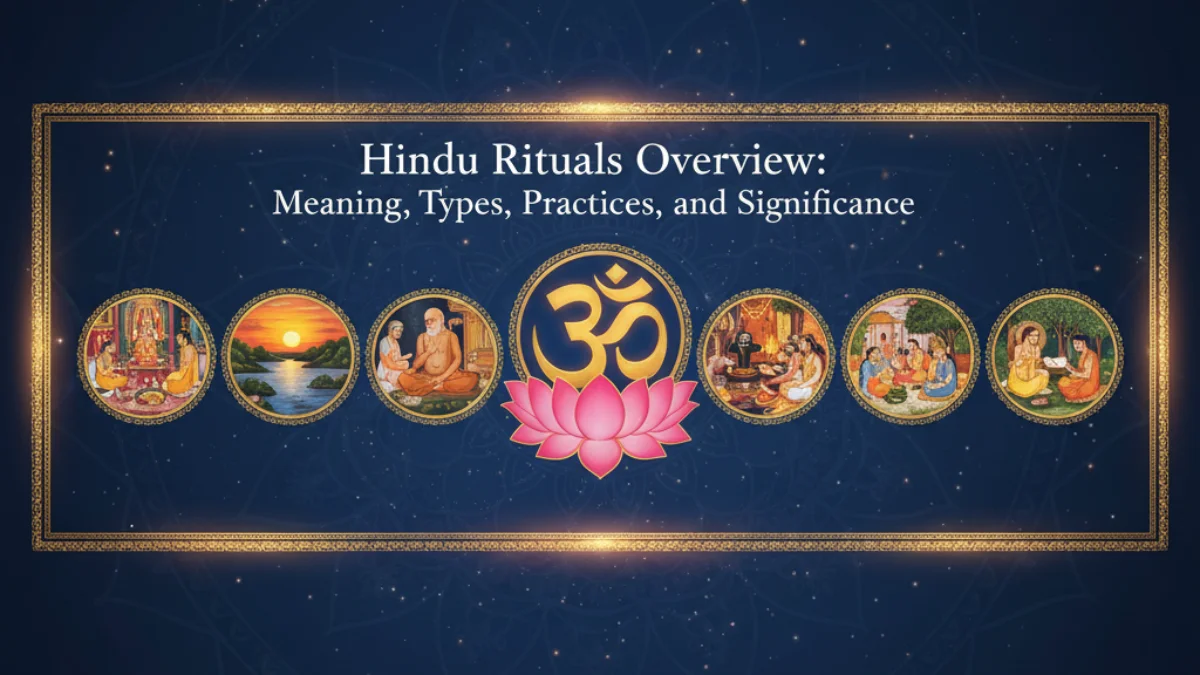Introduction
Hindu rituals are at the core of the spiritual, cultural, and social life of millions, shaping everything from daily habits to life-cycle ceremonies. These rituals, rooted in Sanskrit scriptures, regional traditions, and centuries of practice, provide structure, meaning, and connection. A Hindu rituals overview helps us understand what rituals are, why they matter, and how they are performed across diverse communities.
Whether it is puja at home, yajna at the temple, or life events like marriage and death, rituals define the way Hindus relate to the divine, to ancestors, and to each other. In this article, we explore what Hindu rituals are, who performs them, when and where they are observed, how they are conducted, and why they have persisted and evolved.
What are Hindu Rituals?
“Hindu rituals” (sanskr. karma, samskara, puja, etc.) encompass a broad range of practices: daily worship, offerings, fire ceremonies, life-cycle rites, purification, meditation, chanting, and more. They serve multiple purposes: devotion (bhakti), purification, expression of faith, social solidarity, and continuity of tradition.
Key concepts include:
- Pūjā: Worship through offerings of food, flowers, incense, and light.
- Yajñā / Homa: Fire sacrifices and offerings to the sacred fire (Agni).
- Mantra and Japa: Reciting or chanting sacred words for focus and power.
- Sevā (Service): Service to deity, temple, or community.
- Saṃskāras (life-cycle rites): Ceremonies marking stages like birth, initiation, marriage, and death.
Historical Context: Origins and Evolution
| Period | Key Developments | Cultural Influence |
|---|---|---|
| Vedic Period (1500-500 BCE) | Fire sacrifices (yajna), chanting of Vedas, priestly mediation. | Northern India; Brahminical roots. |
| Post-Vedic / Puranic | Rise of temple worship, devotional practices, home rituals. | Spread across India; diverse regional forms. |
| Medieval | Local deities, vernacular mantras, bhakti movements. | Strong regional and caste variations. |
| Modern | Online puja, diaspora rituals, eco-friendly practices. | Global Hindu communities. |
Types of Hindu Rituals
1. Daily & Household Rituals
- Morning purification
- Lighting lamps (diya), incense, and bell ringing
- Home puja at personal shrines
- Chanting mantras or japa
2. Fire Ceremonies
- Yajna / Homa: Fire offerings of ghee, grains, incense
- Performed for prosperity, health, or special occasions
3. Life-Cycle Rituals (Saṃskāras)
| Life Stage | Ritual | Elements |
|---|---|---|
| Birth | Namakarana | Naming ceremony, blessings |
| Initiation | Upanayana | Sacred thread, Vedic chanting |
| Marriage | Vivaha | Vows, fire ritual, seven steps (saptapadi) |
| Death | Antyeshti | Cremation, ancestor offerings |
4. Devotional & Festival Rituals
- Singing bhajans, dancing, community processions
- Distribution of prasada (sanctified food)
5. Purification Rituals
- Punyāham: Purifying space and participants
- Jalabhisheka: Pouring water on deity images
Who Performs Rituals & Where
- Who: Householders, elders, or priests (depending on complexity).
- When: Determined by lunar calendars, auspicious timings (muhurta).
- Where: Homes, temples, sacred rivers, pilgrimage sites, or festival grounds.
Why Hindu Rituals Matter
- Spiritual: Connects devotee with divine.
- Moral: Reinforces dharma, purity, and respect.
- Social: Unites communities through shared practices.
- Psychological: Provides symbolic renewal and emotional grounding.
- Cultural: Preserves identity while adapting to modern life.
Variations in Rituals
- Regional: Tamil Nadu vs. Bengal puja styles differ.
- Sectarian: Vaishnavas, Shaivas, Shaktas emphasize distinct deities.
- Folk vs Classical: Local folk customs coexist with Vedic rites.
Expert Insights
“Rituals in Hinduism are not mere tradition; they are living practices that encode ethical, cosmological, and social values.” — Religious Studies Professor (Britannica)
- Most Hindu households practice some form of daily puja.
- Surveys highlight the rise of digital rituals—online kits, livestreamed temple worship, diaspora participation.
Related More Articles
- See Durga Puja 2025: Date, History, Significance & Rituals
- Learn about Vishwakarma Puja: History, Importance, and How Workers Worship
- Explore Anant Chaturdashi 2025: Date, Pujan Vidhi, and Visarjan Timings
Conclusion
Hindu rituals are dynamic, living expressions of devotion, identity, and culture. They balance tradition and innovation, sustaining spiritual life while adapting to social change. Understanding their meaning, significance, and diversity deepens our appreciation for their enduring role in Hinduism.
FAQs
Q1: What is the difference between puja and yajna?
A: Puja is worship with offerings and devotion; yajna is a fire sacrifice using mantras and offerings into sacred fire.
Q2: What are saṃskāras?
A: They are life-cycle rites marking stages like birth, initiation, marriage, and death.
Q3: Can non-priests perform rituals?
A: Yes. Household rituals are often done by families, and priests are called for complex or public rites.
Q4: Do rituals differ by region?
A: Yes, with variations in language, deities, offerings, and styles of worship across India.
Q5: What symbols are central to rituals?
A: Fire, water, light, flowers, and sound—all representing purification, life, divinity, and sensory elevation.
Q6: Are rituals changing today?
A: Yes. Digital tools, eco-friendly practices, and globalization are reshaping ritual observance.



